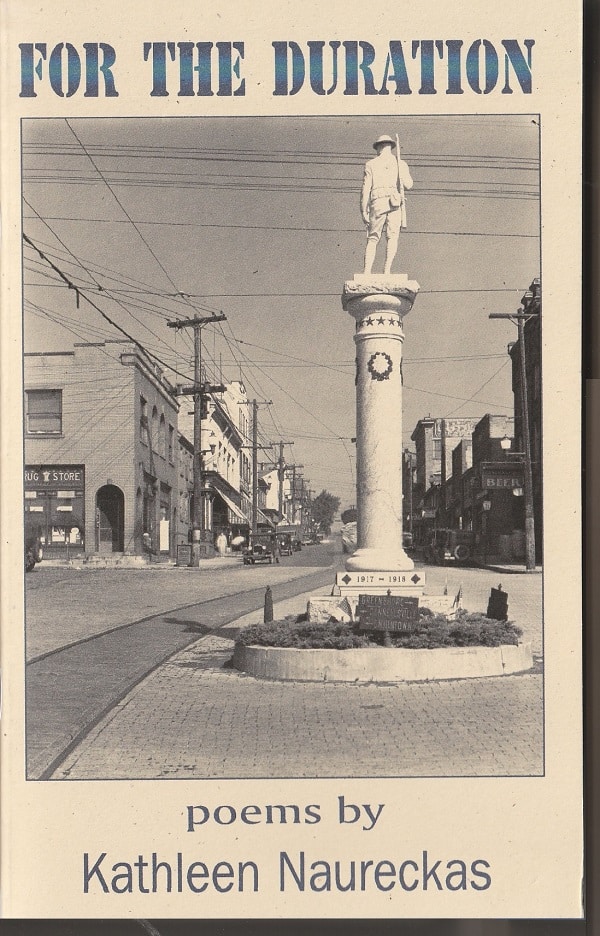There is an elegiac quality to Kathleen Naureckas’s 2012 poetry chapbook For the Duration.
The title is a reference to the phrase she remembered in Mount Pleasant, Pennsylvania, during World War II. It comes up in “False Faces,” a poem about Halloween in wartime: “We called what we wore on Halloween/false faces, not masks…” Hand-me-down costumes were common. She writes:
A new costume was not always to be had.
“There’s a war on” was an easy way of saying no
and many things were scarce for the duration.
“The duration of the war” was what was meant,
but I thought “the duration” was a specific time
in the future, like next Christmas, but farther away.
The first group of poems in this chapbook from Finishing Line Press describe life in the town during the war, but the title has a broader meaning.
For the Duration was published when Naureckas was in her mid-70s, and, in its nineteen poems, she is looking over the course of her life. It opens with a description of Mount Pleasant as depicted in a photo by Walker Evans taken in the year before her birth, “Main Street of Pennsylvania Town, 1935.”
And it ends with “Main Street Revisited,” her recollection of the stores along that street, most now gone, and a nod to the “Wal-Mart at the crossroads now,” and the alley behind the home where she was raised. It’s “an avenue now, and bears our name.”
The duration of her life

In these poems, Naureckas is thinking about the duration of her life, and there is much that is melancholic.
There is a poem about her father after getting a pacemaker installed — “When he didn’t come home,/his shined shoes were still beneath the window…” — and another about her mother’s wake where she’d “hate/to be the party’s most neglected guest.”
Two poems are about her husband’s death, including one that deals with his purchase of a new car every year or two and ends: “I bought a Prius by myself this fall.”
“Fourteen forever”
The most poignant poems, though, have to do with the couple’s daughter Barbara. In “Barbara, Running,” Naureckas’s two-year-old sprints across a field to show off “her first firefly.”
But, two pages later, in “Boxes,” Barbara has died as a young teen. It starts, “You are fourteen forever, and the things you left behind/are a fourteen-year-old girl’s….” The poem is written many years later, and it includes these lines:
We gave away your horse, goats, rabbits, and guinea pig.
Even the final dog and cat have died. The hospital used the money
given in your memory to buy Atari games, now obsolete….
.
…I study thirty-year-old women I meet,
the smiling, friendly ones especially, and wonder if that’s what
you’d be like….
It’s impossible to imagine. Fourteen’s the only age you’ll ever be.
A testament
For me, there is an added poignancy to these poems and this collection. Kathleen Naureckas and I both worked at the Chicago Tribune> She was an editor, and I was a reporter. We were in different departments, but I knew her to see her even though I’m not sure we ever exchanged words. The newspaper, in those days, was a big place.
I’ve also been friends with her son Ted through a book club we both belong to.
So, I know that, in 2020, in the depths of the first year of the Covid pandemic, Kathleen died at the age of 83.
I’m glad that Kathleen saw these poems published. As a poet myself, I’m glad she had a chance to put her memories and perspectives from late in life into print. (I know there’s another of her manuscripts that is supposed to be coming eventually from another publisher.)
When she wrote these poems, Kathleen was looking back on much that she had lived, on much that had disappeared or had greatly changed, and on much that was mournful, such as the loss of family members and the loneliness of being left behind.
Yet, all of these poems exhibit a strength of character — an openness to the need to face loss and change and to deal with it.
They are a fine testament to Kathleen’s life and her art.
Patrick T. Reardon
3.14.23
Written by : Patrick T. Reardon
For more than three decades Patrick T. Reardon was an urban affairs writer, a feature writer, a columnist, and an editor for the Chicago Tribune. In 2000 he was one of a team of 50 staff members who won a Pulitzer Prize for explanatory reporting. Now a freelance writer and poet, he has contributed chapters to several books and is the author of Faith Stripped to Its Essence. His website is https://patricktreardon.com/.
